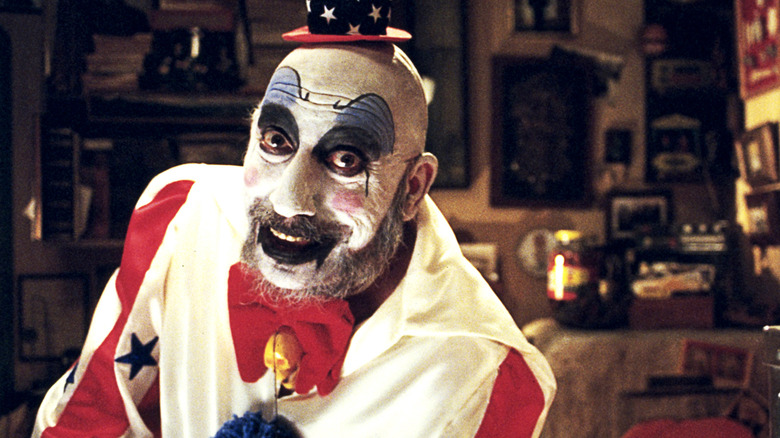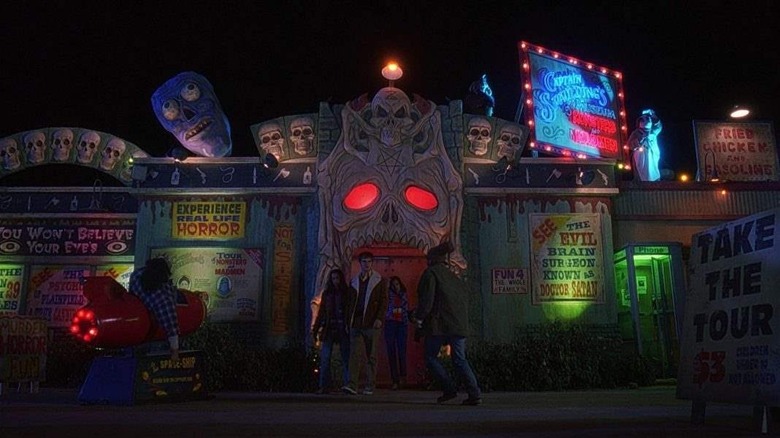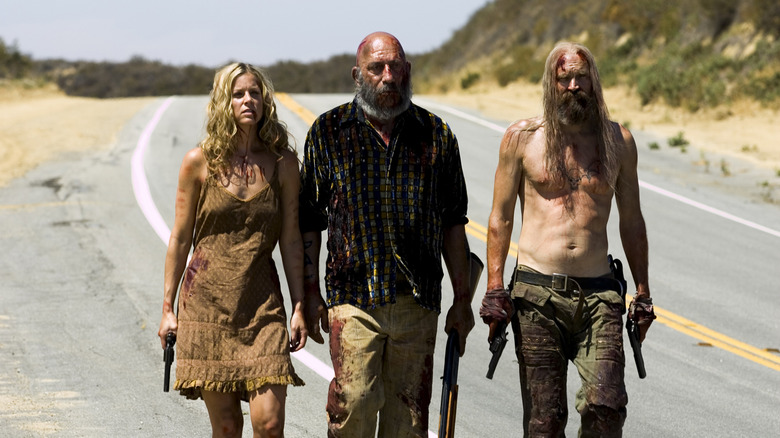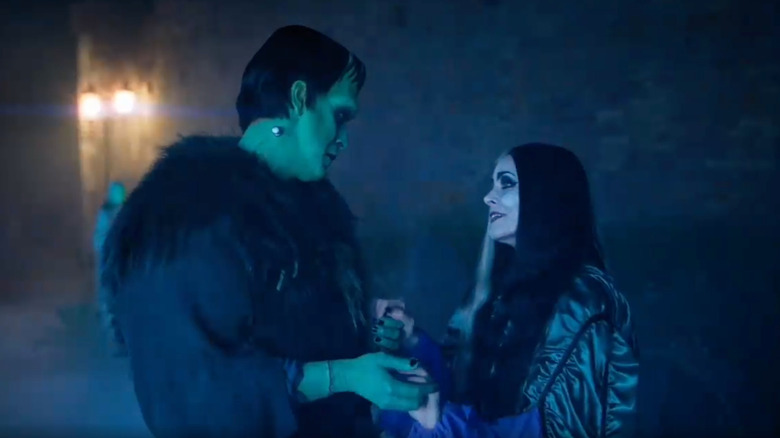Why Rob Zombie Made It A Point To Remove Humor From His Horror
Anyone who's a fan of Rob Zombie's music career knows the rocker has a playful approach to his material that can dive straight into the humorous and farcical. After all, anyone who entitles a song "Well, Everybody's F***ing in a U.F.O." (a song that features a lead vocal from Zombie performed in a faux-Southern drawl) isn't taking themselves too seriously.
Yet what fans of Rob Zombie (or Robert Bartleh Cummings, if you aren't into the whole brevity thing) also know is that the artist is as multi-faceted as he is talented. His movies, despite existing exclusively within the horror genre, feature a variety of stylistic approaches and tones. His horror films are among the most brutal ever made, with "The Devil's Rejects," "Halloween II" and "The Lords of Salem" being exceedingly grim films that never allow the audience even a tiny breather with humor or lazy facetiousness.
While even those movies have their tiny moments of levity, Zombie has never made a fully-fledged live-action horror-comedy, except for his debut feature, "House of 1000 Corpses," which introduced the rocker to the big screen with his spook-a-rama vibes intact. As Zombie's film version of "The Munsters" approaches its release next month (which is clearly a goofy — and PG rated! — comedy), it's a good opportunity to take a closer look at the director's thoughts on humor in horror.
'I just needed to get that kind of horror movie out of my system'
Zombie is one of those artists whose life and interests are so clearly reflected in his art that his career seems almost like the product of destiny as much as hard work. Growing up the son of parents who lived and worked in a traveling carnival, Zombie loved horror movies, Halloween and rock 'n' roll. After studying at (and being kicked out of) New York's Parsons School of Design, it was in music that he first found success, forming a band called White Zombie and writing a lot of songs with horror themes and subjects.
After directing a handful of music videos throughout the '90s and designing a spooky attraction for Universal Studios in 1999, Zombie was given the chance to develop his first feature, a movie that would become "House of 1000 Corpses." The movie follows a group of naive young adults who happen upon a dilapidated tourist trap that leads them to the garish, Gothic home of the Firefly family, who of course are a not-so-secretly a group of depraved murderers.
In other words, the movie is very much the kind of film one might expect from Zombie the musician, a quality the director acknowledged in a 2013 interview for Complex. As he said, "'House of 1,000 Corpses' pretty much stands alone. I just needed to get that kind of horror movie out of my system."
Zombie sought to bring a dangerous edge back to the horror film
After "House of 1000 Corpses" and all of its outrageous, goofy Dr. Satan-ness was out of Zombie's system, the director had a clear agenda for his movie career going forward. In that same Complex interview, Zombie stated that "with each subsequent film I've wanted to make [my movies] grittier and darker."
Sure enough, Zombie's follow-up to "Corpses," "The Devil's Rejects," is a powerfully gritty and almost no-nonsense horror-crime film that not only proved the filmmaker had the ability to achieve a different tone, but could do so within the same fictional universe. His remake of John Carpenter's "Halloween" and its subsequent sequel, "Halloween II," are two of the bleakest slasher movies ever made, and "The Lords of Salem" — arguably Zombie's high point as a director — perfectly evokes the unsafe and artistically minded (as opposed to commercially minded) horror movie of the '70s. It's those '70s classics that Zombie was attempting to evoke, not just in form but in mood. As he explained:
"That's the way I remember horror. These days, most horror movies seem to be rated PG-13 and they really want them to appeal to a wider audience, whereas all the films I grew up watching and loving, from 'The Holy Mountain' to 'Eraserhead' and something like 'Cannibal Holocaust,' they didn't appeal to everybody. They had a very heavy tone. They weren't made for everybody. That's the way I look at my movies: You can't please everybody with this kind of material. And in order to please everybody, it seems like you have to water it down so much. I don't care to do that."
Zombie doesn't abandon horror-comedy completely
Yet it would be a fallacy to claim that Zombie has either lost his cinematic sense of humor or abandoned it in favor of a single-minded quest to make the horror movie challenging again. Even though his aforementioned films are quite downbeat, they all feature some humorous moments sprinkled throughout (witness the cameo by "Weird" Al Yankovic in "Halloween II"), and many of Zombie's characters walk a tightrope in terms of tonal shifts. For instance, the portrayal of the Firefly family in "Rejects" and "3 From Hell" is highly akin to the similarly uncomfortable clown-like nature of evil characters in the films of Tobe Hooper and John McNaughton.
There's also the fact that Zombie never completely abandoned making out-and-out horror-comedy. His faux trailer for 2007's "Grindhouse" plays up the concept's goofiness, and, even though he called "House of 1000 Corpses" a "wacky cartoon" when compared to "The Lords of Salem," he directed an actual cartoon film in 2009 entitled "The Haunted World of El Superbeasto."
With "The Munsters," it appears Zombie is further stretching his range and his image, making his very first PG-rated, family-friendly feature. It's a testament to how effectively he'd crafted the persona of Rob Zombie, the uncompromising, R-rated horror director, that such news came as a shock. Yet if there's anything the son of amusement park folks knows, it's how to put on a rollercoaster of a show.



